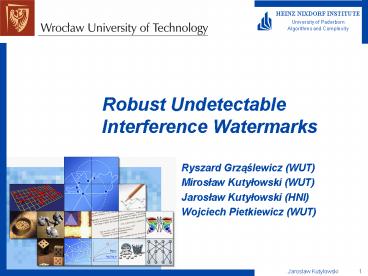Robust Undetectable Interference Watermarks - PowerPoint PPT Presentation
Title:
Robust Undetectable Interference Watermarks
Description:
not suited for web crawlers. Key features of our scheme. watermarks encoded in spatial domain. resistant against attack preserving distance between points ... – PowerPoint PPT presentation
Number of Views:31
Avg rating:3.0/5.0
Title: Robust Undetectable Interference Watermarks
1
Robust Undetectable Interference Watermarks
- Ryszard Grzaslewicz (WUT)
- Miroslaw Kutylowski (WUT)
- Jaroslaw Kutylowski (HNI)
- Wojciech Pietkiewicz (WUT)
2
Introduction
- Motivation
- undetectable watermarks cannot be detected in an
image - only the owner can prove his rights to an image
using a secret private key - not suited for web crawlers
- Key features of our scheme
- watermarks encoded in spatial domain
- resistant against attack preserving distance
between points (filtering, rotation, JPEG
compression) - resistance against some attacks changing distance
between points - watermark can be reconstructed from a small part
of image - original image not needed for reconstruction
- large computational effort for reconstruction
needed
3
Physical motivation
- Interference Youngs experiment
4
Scheme overview
5
Construction of simple interference image
- Watermark image
- all black with some white points
- white points are light source
- set of white points
6
Construction of simple interference image
- Interference image
- interference image is placed at distance on
top of watermark image - each light source from influences each
point of interference image - distance and determine strengthof
influence - this is approximation of real physicalinterferenc
e image - drawback visible pattern
7
Construction of encrypted interference image
- Interference image
- consider the influence of one point from
- previously it influenced a point at distance
with - a ring at distance consists of cells of size
- intensity of each cell defined by value of hash
function - the angle is taken modulo repetition of
the same sequence - key is needed for computation of values
- interference image does not containvisible
patterns
8
Scheme overview
9
Reconstruction of watermark
- General idea
- determine the intensity of each point
of the watermark image - take the watermarked image (cover image
interference image) - generate interference image for point
- compare them
- if there is strong similarity assign
a high value
Low similarity small pixel value
High similarity large pixel value
Example with simple interference image not with
encrypted usually the encrypted would be used
watermarked image
interference image for
10
Reconstruction of watermark
- Idea (continued)
- look for the highest valued points
- check whether these points form a valid watermark
- use equilateral triangles
- certain number of triangles of specific edge
length must be found to form a watermark - Properties
- for the points actually in
- there will be a large similarity between the
watermarked image and the interference image - there are points to check
- for each point operations are needed to
compare the images - key is needed for reconstruction
11
Reconstruction of watermark
- Additional operations
- the reconstruction must be repeated for all
rotations with degree - this yields resistance against rotations of the
image - the scale factor of the image must be determined
- take a small part of the image
- there should be at least one white point from
in this part - check different scale factors and perform
reconstruction of this image part for it - determine scale factor with largest peak value
this peak corresponds to a white point from the
watermark - perform full reconstruction with this scale factor
12
Experimental results
- Evaluation against StirMark 3
- 77 of 89 tests passed
- Cropping all passed
- Removing rows/columns only lighter one passed
- Flip all passed
- Scaling all passed
- Change aspect ratio all passed
- Rotation with cropping for rotation smaller
than 30 passed - Rotation with cropping and scalling for
rotation smaller than 30 passed - Shearing only simple ones passed
- Linear transformations not passed
- StirMark not passed
- Gaussian filtering all passed
- Sharpening all passed
- Median filtering all passed
- LRAttack all passed
- JPEG compression all passed
13
Conclusions
- Results
- robustness against attacks basing on filtering
and local editionsof image shown - robustness against some linear transformations
(rotating, scaling) shown - Further work
- methods for detection of general linear
transformations needed - methods for detection of nonlinear
transformations needed
14
Thank you for your attention!































